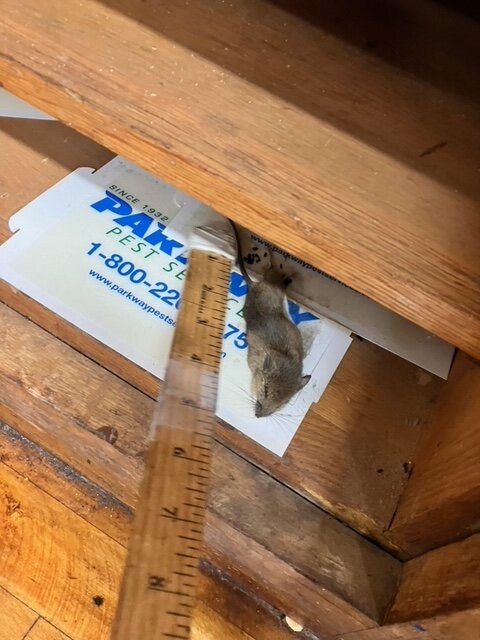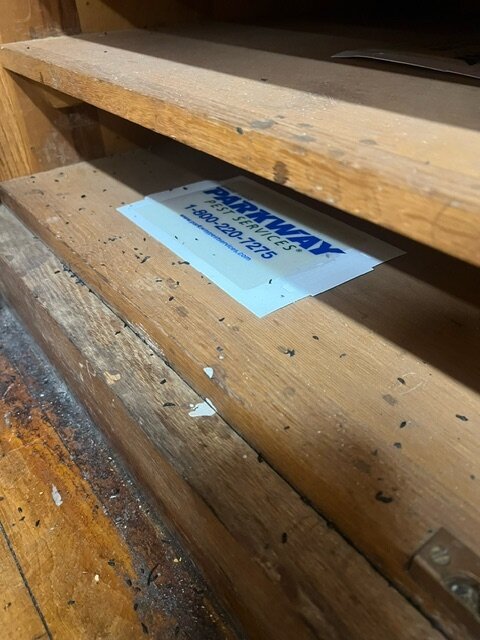Valley Stream students cry foul over 'repulsive' rodent problem
Administrators say the rodent problem is under control. Students say differently.
Valley Stream North High School senior Manmeet Singh dreads the thought of going to school for what could be scuttling near his feet. For months, he reports, teachers and classmates have been sharing hallways, classrooms, lockers, and even their snacks with some unwanted visitors: rodents.
In the past few weeks alone, Singh recalled, students found cotton balls covered in rodent droppings in the side closet of his AP environmental science classroom where lab supplies are kept.
“The cotton has turned a brownish-blackish color,” Singh said, bewildered at how students could be asked to learn anywhere in the vicinity of vermin poop.
“It’s absolutely disgusting.”
More than a simple nuisance that casts an icky pall over the school, he said, rodents are actively getting in the way of student learning — including his own.
“Because of the mice dropping ruining our lab supplies, my class hasn’t been able to do our two final labs, which we need to get credit for the class or else we won’t pass the AP college board curriculum,” Singh said. “Our parents are paying for these materials.”
Furry four-legged free-loaders
Another North student, Swaraj Pandit, has sworn off leaving snacks in his locker — a familiar practice among classmates — after a traumatizing experience a few months back. Pandit found a hole in his box of cookies, which he kept stashed in his locker. At first, he didn’t think much of it, chalking it up to some mistake with the store packaging and tossing it out.
But then one day after leaving $80 worth of bagged Stop&Shop snacks in his locker, he was incredulous to see the bags covered with tiny bite marks and soon realized he had a mice problem. The ordeal wasn’t over.
“When I went to get one of my schoolbooks out from the lockers, I discovered mice droppings everywhere, and even one of my papers had been chewed out,” said Pandit, who claims students have reported similar situations, from spotting dead mice in their lockers to discovering the nibbled-at remains of snacks and snack wrappers, or worse, accidentally eating them.
County finds high number of violations
The students’ outcry comes after a release of an analysis by media reports in which Nassau County health inspectors cited the Valley Stream Central High School District with 137 health code violations from 2017 to 2023.
Of the handful of school districts inspected during the health department’s biannual food safety inspections, Valley Stream came in second for the number of violations, eclipsed only by the Hempstead district with 142.
The district released a statement seeking to dissuade concerns about vulnerabilities in its food safety measures.
“The safety and health of our students is always our first priority. We are constantly working with our food service providers to maintain clean and healthy cafeteria and kitchen facilities,” wrote Superintendent Wayne Loper. “We take these health infractions seriously, and we will continue to strive to resolve any maintenance issues before they arise.”
The health infractions included the discovery of rodents, bugs, or both at all three high schools and Memorial Junior High School during their food inspection visits as recent as last year.
Under state and federal law, violations customarily are classified as critical and non-critical. Insects and rodents are considered not critical, meaning they do not directly cause foodborne illnesses or injury but can hamper the upkeep and cleanliness of the building.
As Rudy Hosler, manager at Arrow Exterminating notes, seeing the occasional mice or rat skittering through large buildings like a public school is not, on its own, cause for alarm.
“Unless in extreme circumstances where you have thousands of critters running around, there could be (particulates) of droppings in the air, but that’s a rarity,” he said.
What health risks do rodents pose?
When dealing with mice and other pests, school districts start to cross into dangerous territory once food and rodents mingle and when such sightings are frequent.
Because mice are prime carriers of bacteria like salmonella “the biggest concern is that they contaminate food sources,” said Hosler. “Wherever a mouse travels, they are constantly urinating, leaving behind what is called ‘micro-droplets’ and defecating over 100 times a day” which could transmit viruses to humans, particularly via contact with food.
Last October, health inspectors cited the district with a critical health violation after spotting evidence of rodents hunting and digging through food in a dry storage room at the Valley Stream Central High School cafeteria. A double-bagged plastic bag of breadcrumbs had a gnawed hole through it. Boxes of cereals and shelves were covered in rodent droppings.
“If the school district cleans their food preparation services regularly, if foods are properly stored and if food preparation surfaces are wiped down, it shouldn’t be an issue,” said Hosler. “It’s almost impossible to completely rodent-proof a school, but if the established rodent population is growing, and if you see mice often in a certain area, that needs to be addressed because that’s a big concern. There’s no other way to put it.”
Other North students like Sebastian Rick have not reported regular run-ins with rodents but says he has witnessed some scurrying in the boys’ locker room at Valley Stream Central where he plays lacrosse. He does, however, agree with his friend Dylan Rios, that Central has garnered a reputation among his classmates for being “dirty.”
Singh, nevertheless, remains outraged, arguing that the violations health inspectors have been able to flag only hint at the full reality of the situation, which is much bigger and more out-of-hand than what administrative leadership has been willing to admit.
“Our superintendent told us days ago that measures were being taken but there’s not enough being done at this point,” said Singh. “It’s repulsive to just think about.”
Have an opinion on this article? Send an email to jlasso@liherald.com.









